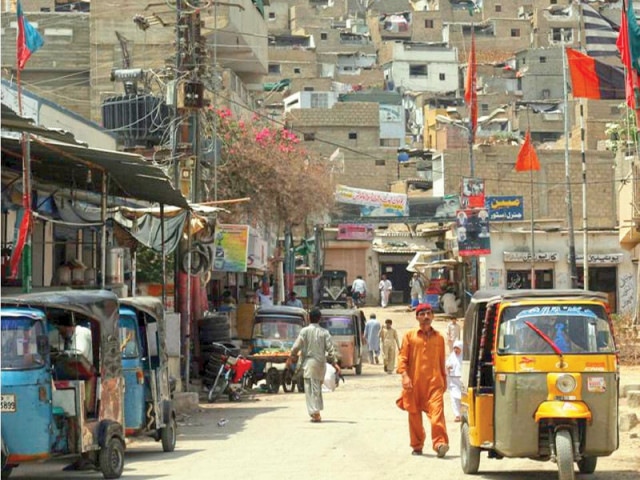Urban sprawl: Karachi needs one planning agency with teeth and control of its purse strings
Managing physical development in Karachi: a framework for change.

Land in Karachi is acquired and developed through means legal and illegal by a powerful nexus of private land developers. PHOTO COURTESY FARHAN ANWAR
Among the key reasons for this disconnect is an absence in continuity as each new planning document has taken a new direction to the planning approach but in the intervening period no effort has been made to continuously update the database.
Another reason for the relative failure to plan has been a lack of mechanisms in the planning body to implement and finance its work. Add to this the absence of a political mandate. Other than the Karachi Strategic Development Plan 2020, no other plan has been given legal cover. Last but not least, stakeholders have not been consulted.
As a result, land is acquired and developed through means legal and illegal through a powerful nexus between private land developers, politicians and bureaucrats. Land use categories (example: amenity plots for parks) are often violated by encroachments and decisions to change their purpose, plot ratio and other building regulations (reducing the compulsory open spaces etc). Land is often sold at throwaway prices as a means of political patronage.
However as one considers the pattern of development, it is in many ways linked with the concept of supply and demand and there is a genuine need to accommodate certain growth patterns — such as commercialisation of land — within the context of a properly thought out and a legally, technically, administratively and institutionally sound urban policy, planning and development framework.
Looking ahead
It is now time to plan realistically and with a clear vision on how Karachi can continue to perform viably in the role of the commercial engine of the country within a revised planning context. A framework for change has to incorporate the following considerations: Institutional arrangement with public oversight and planning controls.
Ideally, the institution most likely to guarantee protection of a city’s interests is a strong city government. It is difficult to have a truly empowered city government in Karachi or for that matter anywhere in Pakistan unless they are truly empowered in matters of policy and finance, in particular, to chart their own course. Presently, many of the local government functions are performed on the behest of the provinces. There is little autonomy in what the local governments can do and their existence is dependent upon their relationship with the provincial governments. Added to this, the presence of multifarious institutions with overlapping functions and boundaries in the metropolitan area of Karachi is a significant reason for the inadequate level and poor quality of services provided in the city.
There is a need to establish a supra Planning & Physical Development Agency with room for formalised input from private experts and civil society (example: Citizens Commissions) that has the authority to cut across this divide by getting all the various land-owning agencies and service providers to sit across the table and plan for the city in a harmonious manner, collectively and not in a disjointed manner as is the case at present.
Such an agency then has to be vested with the powers to not only to plan but also to supervise the financing and implementation of the planning recommendations. For this agency to succeed, it has to act with independence and authority and requires political ring fencing in terms of its access to financing, decision-making and powers of implementation.
The main functions of a planning and physical development agency would include:
Research and documentation of data indicators/trends; analysis of data; information sharing and consultation with civil society stakeholders; strategising/planning and recommending; supervising the financing, implementation and monitoring.
Planning controls
It is now being suggested that zones specified for either exclusive commercial land use or densification or mixed uses or both are identified in the city to locate the burgeoning commercial growth based on a set of carefully established selection criteria and those zones be planned and governed through sound planning controls and regulatory mechanisms. The criteria for selection should both be established based on a rigorous research and inclusive stakeholder consultation exercise.
Farhan Anwar is an urban planner and runs a non-profit organisation based in Karachi city that focuses on urban sustainability issues. He can be reached at fanwar@sustainableinitiatives.org.pk
Published in The Express Tribune, October 28th, 2013.



















COMMENTS
Comments are moderated and generally will be posted if they are on-topic and not abusive.
For more information, please see our Comments FAQ